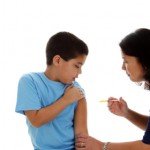The more I read about the relatively new syndrome PANDAS, Pediatric Autoimmune Neuropsychiatric Disorders Associated with Streptococcus, the more I realize how complex the issues are that surround it. We appear to be entering a new field of medicine, one that holds enormous potential for unlocking the root causes of baffling problems in neurology and psychiatry
The story starts in the mid 1990s when Dr. Susan Swedo, now Chief of the National Institute of Mental Health's (NIMH) Pediatrics & Developmental Neuroscience Branch , reported that childhood obsessive-compulsive disorder (OCD) may sometimes be triggered by a strep infection. OCD may involve compulsive handwashing, twenty or thirty times a day; it can manifest itself as a need to have things "just so" in order to relieve anxiety, repeating and checking behavior, counting and arranging objects or clothing, hoarding, praying, reading a section of a story over and over again.
Some of these youngsters also have tics, involuntary movement disorders. Another subset just has tics, but no OCD.
A moving portrait of a child who fits this profile was published in the Los Angeles Times early this month. The boy involved wa a normal eleven-year-old sixth grader until he developed a strep throat. Then his behavior altered to the point where daily life seemed totally changed; he became obsessed with being clean and afraid of germs to the point where he was unable to go back to school.
Increasingly these diseases and perhaps others are being linked by some eminent researchers to strep infections. A senior immunologist at the University of Oklahoma College of Medicine thinks the mechanism of PANDAS involves antibodies, released in response to a strep infection, that can bind to brain cells and cause the release of dopamine, a brain chemical which in excess, may be linked to OCD and tics. The diagnosis, at the moment, is strictly clinical; there is no lab test to confirm that a child has PANDAS.
Many youngsters with OCD and/or tics don't appear to have this strep-related syndrome and some equally prominent academic physicians feel kids can have a mental health/neurological disorder first and just have it exacerbated by strep throat or other infections. Others want to treat the most severely affected of these children with antibiotics even if they don't have an active strep infection.
The NIMH makes the point that these children, as opposed to others with OCD and/or tics, have an abrupt worsening of their symptoms when they have a strep infection. They then will have a slowly improving course after a few weeks or months.
The guidelines are admittedly vague; NIMH says PANDAS can be "identified after two or three episodes of OCD or tics that occur in conjunction with strep infection."
A senior Harvard professor of psychiatry who is the head of the International OCD Foundation's scientific advisory board has been quoted as saying the portion of OCD linked to PANDAS is "exceedingly common."
Is this the tip of an iceberg of neuropsychiatric problems linked to infections? Only time and lots of research will tell.





